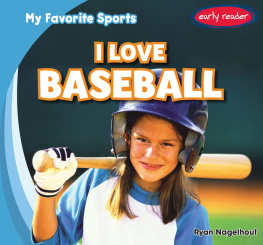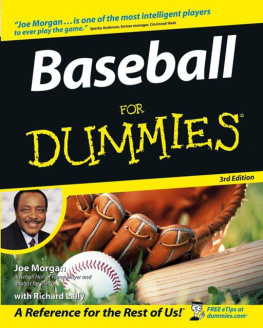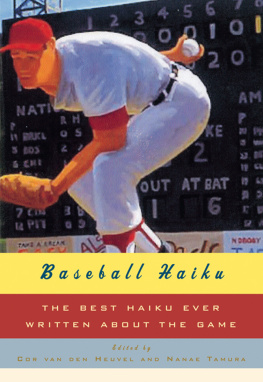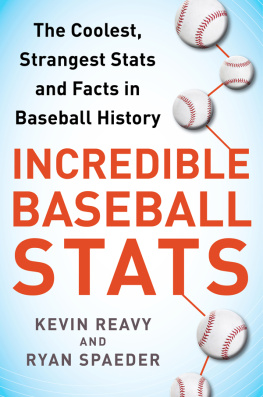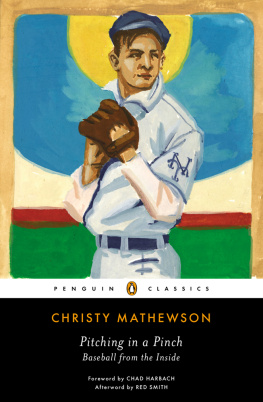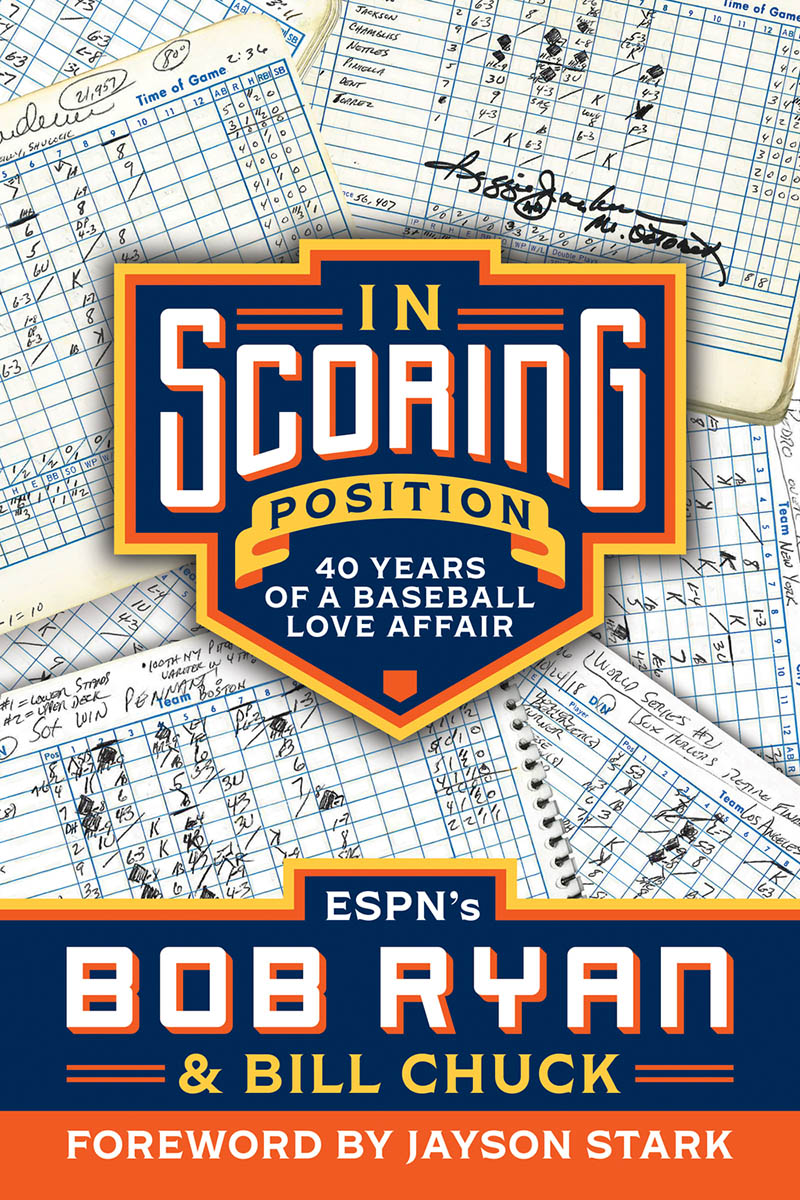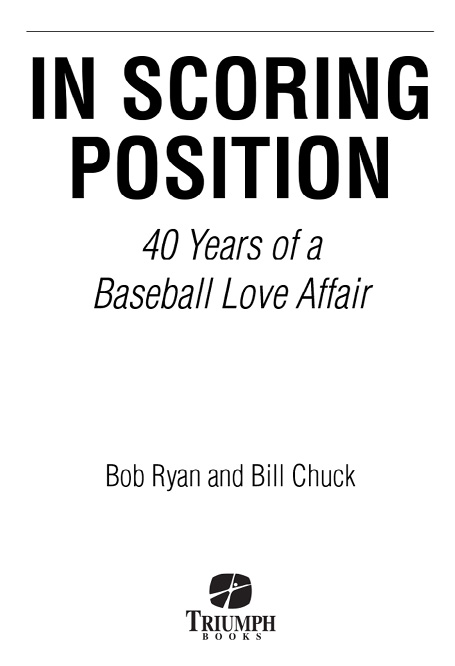
This book is dedicated to the memory of my dad, Bill Ryan.
My baseball DNA comes directly from him.
Bob Ryan
This book is lovingly dedicated to my wife, Maxie; our children, Elizabeth (and Lucien) and Jen (and Hannah); and to our grandchildren, Alexa and Archer. May they always find something to be passionate about (even if its not baseball). And to my pup dog, Casey, who was either by my side or insisting on a game of catch with me throughout my writing of this book. He committed no errors.
Bill Chuck
Contents
Foreword by Jayson Stark
All over my house, Ive got these big, thick, spiral-bound books. Theyre piled one on top of another, stuffed into any spare shelf space I can push aside to make room for them. Theyre known as scorebooks. And theres a reason Ive hung onto every darned one of them, much to my wifes dismay: Theyre among my most sacred possessions.
To members of the human race who have never called themselves sportswriters, those books look more like a collection of illegible graffiti than books full of memories and treasures. But to people like me and Bob Ryan, well, we know the truth. The secret meaning of these books is buried deep inside our souls.
We have spent our lives attending games people play, and we cant just sit and watch. We write stuff down. We record it in our personal scorebooks, and it is there forever, any time we need to reach back in time and recall: Hey, what was the count again when Big Papi hit that walk-off in the middle of the night against Paul Quantrill? (Correct answer: 2-and-1.)
Every page in those scorebooks tells a story, and I cant believe it took all these years for two guys as brilliant and creative as Bob Ryan and Bill Chuck to recognize theres an awesome book in all those stories. As I devoured this collection of tales and nuggets, I kept asking myself: Why didnt I think of this? Its brilliant. I hung on every remembrance, on every page, on every scorebook snippet. You will, too.
Ive known Bob now for more than 40 years. I met him at Fenway Park when I was just a kid trying to learn how to be a real sportswriter and he was already one of the most towering and important figures in his profession. He and Peter Gammons were my sportswriting heroes. Even before I ever joined them in any press box, I didnt just read them in the Boston Globe , I studied them. Every epic game story. Every voluminous Sunday notes column. Every cultural reference. Every tiny attention to mind-blowing detail that jumped off the page. Every smart, funny, incisive quote.
Then Peter left the Globe for Sports Illustrated , and (does anyone else remember this?) he bequeathed the Red Sox beat (temporarily) to Bob. It turned out that Bob Ryan loved baseball every bit as much as he loved hoops at The Gahden. He exuded that love every day, with every word he wrote. So any time my first employer, the Providence Journal , assigned me to a day covering the Red Sox, I recognized how fortunate I was to watch the legendary Bob Ryan work his beat. I hope he didnt notice me following him around the clubhouse. Not to stalk him or steal his best quotes. To learn how it was done. To hear how the great ones asked a question. To pick his brain on what mattered, what it meant, what it reminded him of.
Our paths crossed at many a hoop game, tooincluding an unforgettable drive one March evening from Indianapolis to French Lick, Indiana, where Bob would lay eyes on Larry Bird for the first time in person and got so energized, he had to talk his way out of a speeding ticket on the way back to Indy. Throughout my years in the business, those days when Bob Ryan walked into a ballpark I was at became my favorite days of the week. As this book reminds us, there is truly nobody like him.
And then theres my friend Bill Chuck. Long before I ever met him, I felt like I knew we were kindred spirits, through the work of our mutual pal, Nick Cafardo. Reading Nicks Sunday columns, Ill admit there were many weeks I started at the bottom of that column instead of the topbecause that was the place Nick reserved for the Bill Chuck tidbits of the week.
What Bill saw in the special numbers of baseball was something not many people see. The truths they reveal. The generations they connect. The comparisons they allow us to make. The no way revelations they deliver. His genius has been way too underappreciatedbut not by me, lover of those magical numbers that I am.
So we should all be grateful that he and Bob were struck by the same lightning bolt that turned this fantastic idea into a book to remember. It will occupy a proud place on my bookshelves for years to comeright alongside those big, thick, spiral-bound books that nobody in my house understands except me.
Jayson Stark
Preface
Are you a scout?
I could be anywhere. I could be in my seat in Fenway Park. I could be at the wonderfully named Epicenter in Rancho Cucamonga, California. I could be in Wrigley Field. I could be in Hickory, North Carolina. I could be anywhere watching a baseball game with my official Baseball Writers Association of America (BBWAA) scorebook in hand, and I am an anomaly. I am very likely the only person not in the press box keeping score, and this confuses people. The only conclusion anyone can come to is that I must be a scout. First of all, scouts do not keep score. People dont know that. All they know is that this guy is keeping score, so he must be a scout because nobody keeps score in the 21 st century anymore. That went out with the knuckleball and the two-hour game.
Remember the phrase, You cant tell the players without a scorecard? Well, guess what? Ballclubs dont even bother to sell scorecards any longer. There is no demand. Its just not part of the deal.
I dont need a scorecard. I have my scorebook. Its conveniently compact at approximately 8 inches wide and 6 inches long. Its very easy to pack, and pack it I do. For the past 40-plus years, I have never left on a trip without it once the season starts, because you never know when a baseball game is going to break out, and I would feel, well, the equivalent of being undressed were I to attend a baseball game and not be able to keep score. I did get caught with my metaphorical pants down once in Atlanta during a Final Four, but I scored that Braves game on a scorecardthis was a while back, such things were still availableand later copied the game into my scorebook. One slipup in 44 years aint too bad.
Why do I keep score? Number one, it keeps me in the game. It keeps me focused on the action. If youre scoring the game, you need to pay close attention. You want to know if its a single to left or a single to center. You want to know if its a routine fly, a line drive, or perhaps a hump-backed liner, which I call an SL, for a soft liner. You need to know if a defensive play is worthy of distinction and thus gets a star or two. You need to identify a ground-rule double. You need to know if the caught stealing is a 2-4 or a 2-6. And theres always the central issue of a K or a caught-looking backward K.
Beyond that, when you score a game, you have a keepsake. In my case, I have lots and lots of them.
What it comes down to is that baseball is in my blood. Yes, I have a deep personal and professional association with basketball. Its the one sport I was able to play at a scholastic level. The NBA and the Boston Celtics were my journalistic springboard. I am deeply honored to have received the Curt Gowdy Award from the Naismith Basketball Hall of Fame. I would never say a bad word about basketball (other than the fact that I despise the three-point shot).


